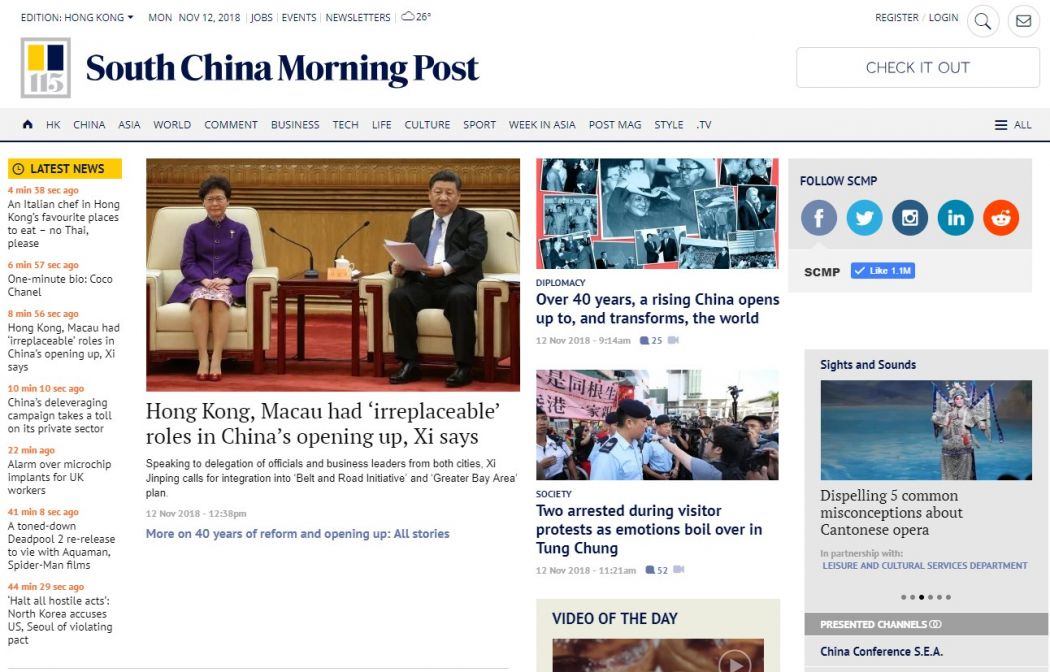Provoked by an absurdly trivial dispute, I have decided to stop writing for the South China Morning Post (SCMP) after years as a contributor. In my heart, though I know that this decision should have been taken for more fundamental reasons back in February.
It was then that the Post became a willing participant in a grotesque propaganda ploy to discredit the detained bookseller Gui Minhai, who was kidnapped and held because of his activities selling books in Hong Kong that embarrassed the Chinese leadership.

Following the worst traditions of the “confessions” that were common in the darkest days of the Soviet era, an allegedly independent newspaper was called upon to give a semblance of credence to a charade dictated by Gui’s jailers, in which he expressed remorse for challenging the Chinese state and undermining its security.
Such confessions play a familiar role in the armoury of dictatorships who are keen to humble, embarrass and, of course, crush those brave enough to stand up to them.
They were commonplace during the bloody years of China’s Cultural Revolution. However back in those crude old days, it was deemed sufficient to confine these confessions to the state media and have them blasted out through loudspeakers.
The old Soviet Union also started out along this route before it occurred to the propaganda bosses in the Kremlin that a semblance of credibility could be obtained by roping in the kind of people Lenin famously described as “useful idiots” to play a special role as allegedly independent observers, who would somehow validate these macabre events.

The captives were given the choice of longer detention – generally accompanied by torture – or a promise of leniency, if they said what the party wanted them to say.
The Post was not alone in participating in this charade as, alongside the predictable ragbag of Communist Party media, Hong Kong’s Chinese language Oriental Daily also volunteered to take part. Had either of the non-party newspapers laid out the circumstances in which this confession (actually Gui’s third) was taking place it could still, just about be argued that they were participating in a valid journalistic enterprise. The Post was clearly exercised about this as the online edition’s headline was changed after initial publication.
However the bottom line is that there was no need to become a part of this gruesome farce in the first place. In a rather weak disclaimer the paper stated that no conditions had been attached to the questions its reporters asked – a line that both managed to enhance the credibility of this charade and suggested that the story which emerged somehow resembled a normal interview.
It is, of course, a tricky business holding the line of pursuing independent journalism in a one party state and compromises have to be made but there are lines which respectable journalists and newspapers will not cross – playing a role in propaganda ploys is an obvious example and hardly difficult to detect.

The reason that dictatorships are so keen on using the services of patsies is that, in their heart of hearts, they know that while their propaganda machines might just about be effective in a society where access to information is severely curtailed, in the wider world party publications tend to be treated with extreme scepticism.
Thus, media purporting to be independent are key to the role in influencing the hearts and minds outside of the dictatorship.
It should be noted that the attraction of patsies for governments intent on spreading black propaganda is not confined to dictatorships. The American government was also a heavy player in this game at the height of the Cold War.
The SCMP, under its relatively new owner, China’s richest man Jack Ma, has decided to lend itself more than willingly to the propaganda efforts of the Chinese state as Beijing seeks a greater role in global affairs.
It is important for the purposes of international communication that the Post uses English as its language and that it has a long history of operating in Hong Kong, which has a reputation, albeit a shrinking one, for media freedom.

So the SCMP clearly has its uses for the grey men in Beijing and Mr Ma’s Alibaba has obliged by pouring resources into both the SCMP’s online and print media, aimed in particular at North America, claiming it is acting as “a window through which the world can learn the complex issues facing China.”
There is no pretence that this activity is profitable. Indeed the Post’s CEO Gary Liu admits that the paper has plunged into the red. However, the losses incurred at the SCMP are a small price to pay for the continued well-being of the massive Alibaba conglomerate and its boss Mr Ma, who is obliged to tread very carefully to preserve his position.
In the hardline Xi Jinping era, the perils for erring businesses have been starkly illustrated and both passive and active acquiescence to the party’s demands are required.
It was widely rumoured that the Kuok family, who sold the SCMP to Mr Ma, had also taken on the Post as a favour to Hong Kong’s new masters in the run-up to the Handover. Robert Kuok, the patriarch of the family which runs the Kerry conglomerate, among other businesses, is no stranger to political wheeling and dealing.

Indeed, he is currently serving as a special adviser to Malaysia’s new government. But it was his deep interests in Chinese business that led him to do the favour of taking over the Post during a politically sensitive period when the Mainland required media friends in then British-ruled Hong Kong.
At the time the paper was owned by Rupert Murdoch’s News Corp. It was a golden era for profit. The SCMP was said to be the biggest profit generator in the Murdoch stable.
But Murdoch was worried that his Hong Kong outpost might detract from his other media aspirations in China and, being the wily operator that he is, recognised that profits had peaked, meaning that he was unlikely to get a better price for the SCMP at any other time.
Going further back in time, the Post has long played a distinctly political game. For most of its history, it was a stalwart supporter of the colonial government and the chosen instrument used for conveying official thinking. That history is now being quietly locked away and pointedly did not figure in its recently published 115th anniversary supplement.

Fast forward to today, and the paper retains a curious mixture of often quite outstanding reporting, including some brave and insightful pieces providing news about what’s going on in the Mainland. This is mixed in with a relentless diet of front-page stories portraying China’s growing prowess in the world both on the economic and political fronts.
Most of the critical voices have been purged from its comment pages leaving a stodgy residue of required reading for insomniacs. Sprinkled on top are some “brave” critics whose licence to criticise is conditional on their readiness to disparage Hong Kong’s home-grown democratic forces.
There are a couple of significant exceptions, but they would understandably not wish to be named as it would jeopardise their positions.
Meanwhile, astonishingly for a regional newspaper, local news has been largely removed from the main news section and it has been decreed that Hong Kong must be denigrated by only being referred to as a “city,” presumably in case notions of self-determination are stirred.

It should be pointed out in parenthesis that Hong Kong’s legal status in the Basic Law is not that of a city but of a Special Administrative Region. However, like many aspects of the law, this tends to be overlooked when it is not convenient.
Despite all this, the paper retains some semblance of independence but this is seriously undermined by a willingness to serve the worst aspects of the Chinese propaganda machine.
As for me, I have been in this game long enough to know that when journalists get involved in a bad media neighbourhood, bad things happen, and they get worse. I have had a very long association with this paper, but the negatives of association now mightily outweigh the positives.
